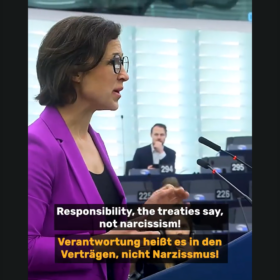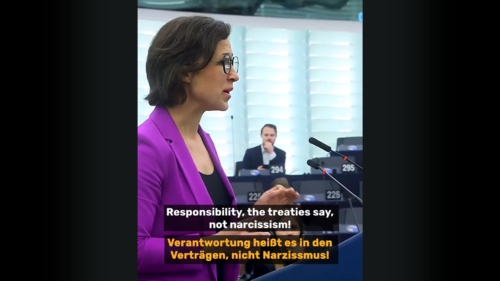On women claiming their spots, the fight for human rights, and how we can save the planet together
Saudi-Arabia and Oman: These were the two destinations I visited last week as the chair of the European Parliament’s Delegation for relations with the Arab Peninsula. Women in both countries are claiming their spots and are increasingly visible in the public sphere. I wanted to make sure that with our own delegation, we do not fall behind. That’s why I insisted that I would only travel if the delegation was gender balanced. I’m glad to say that we were successful with this! Imagine what signal we would have sent if I had been the only woman representing the European Parliament … Sometimes it is these things that make the difference.
The situation of women, the death penalty, imprisoned activists: Key issues in Saudi Arabia
At this first visit of a European Parliament Delegation in Saudi-Arabia since the killing of Jamal Kashoggi in 2018, addressing human rights concerns was a priority for us. We frequently raised the situation of imprisoned Saudi human rights activists, including when talking to the Minister of Foreign Affairs, Ahmed Al-Jubeir, members of the Shura Council (an advisory body whose members are appointed by the king) and the Saudi-Arabian Human Rights Commission. For example, we mentioned Raif Badawi, the laureate of the 2015 Sakharov Prize, and the cases of five imprisoned women human rights defenders – amongst them Lujain al-Hathloul, who is currently facing trial. The European Parliament has protested their imprisonment with several resolutions.
Of course, there are many more concerns in Saudi Arabia: the use of the death penalty, the lack of gender equality and restrictions on political rights such as the freedom of assembly, to mention only a few. When raising these points with Saudi representatives, we were often told that the country is in the process of major reforms and that improvements can be expected. There was genuine interest to engage in a regular dialogue with EU representatives on human rights. We will follow up on this in the coming months – and continue supporting those in Saudi-Arabia that are pushing the human rights agenda.

A fatwa that allows to drink wine?
Over the past few years, Saudi society has evolved rapidly. This can be seen, for example, in the role of women. For decades, they were largely hidden from the public eye. Now, many restrictions have been lifted, including on car driving and travelling abroad. Dress codes are changing fast as well: Before our arrival, no one could tell us women with certainty whether we would be obliged to wear an abbaya (black dress covering all body parts).
In the end, we didn’t need to, and no one seemed to care that we came in colourful dresses. Even for the locals, the speed of change seems to be overwhelming at times. One Saudi told me that he had planned to travel to Bordeaux this summer. But then, he said jokingly, he decided to postpone the trip because “maybe until next year, they will make a fatwa that allows us to drink wine here!”

Between progress and prison: the ambivalence in Saudi society
I was glad to meet two female members of the Shura Council for a personal exchange. They had been amongst the first women to be appointed to the council, and they explained to me how women are now participating in politics. They told me what it meant to them and to their families that their pictures were being taken and appearing in newspapers, how they had to fight for recognition but were always being supported by their male colleagues. And they pointed out how proud they are about what they have achieved in recent years. The speed of change allowing many women to now claim their spots in Saudi-Arabia contradicts the fact that others remain in prison for doing the same. Overcoming this ambivalence will be a key challenge for the country.
UN experts have accused the Saudi-Arabia-led coalition of actions that may amount to war crimes in the ongoing civil war in Yemen, and the European Parliament has repeatedly called for an EU-wide arms embargo on the country. During our meetings with Saudi officials, we discussed these and other topics, like the proxy wars in Syria and Libya. A reoccurring issue was also Trump’s Middle East Peace Plan, which Saudi-Arabia criticizes. We also stressed the important role of the Gulf Cooperation Council (GCC) and underlined that we want to work on strengthening parliamentary relations between the EU and the GCC. I was happy to hear how often the EU was referenced as a role model for those working towards a more peaceful Arabian Peninsula and Middle East.
Climate change: towards more renewables
Finally, we had a number of meetings regarding the G20 presidency of Saudi-Arabia (the final summit will be in November) and the “Vision 2030” plan which includes key ambitions for how to reduce Saudi-Arabia’s dependency on oil. It is crucial that the EU fulfils its own obligations made in the Paris Agreement. However, to save the planet, we also need to cooperate with major oil exporting countries, such as Saudi-Arabia, to encourage them to reduce their exports and consumption considerably. This means that they need to diversify their energy sources (towards renewables) – a challenge that the EU is facing as well. Making this happen in a way that benefits people, the economy and the climate is a project on which close cooperation between the GCC and EU can benefit everyone. This is something I will continue working towards in the coming years.
Oman – a pillar of stability
Following our stay in Saudi-Arabia, we continued to Oman, where the political situation has recently changed with the death of Sultan Qaboos bin Said and the designation his cousin, Sultan Haitham bin Tariq, as successor. The late sultan had been highly appreciated in Oman and beyond.
Right before we reached Oman, Sultan Haitham had given his inaugural speech after the end of the official 40 days mourning period. He stated that he wanted to continue the political projects of the late Sultan and wants Oman to stay an important facilitator for all powers in the region.

Symbolically, this was shown by the new arrangements of portraits in official buildings: Rather than replacing the picture of the late Sultan with that of the new one, Sultan Haitham requested to put them side by side.
During our meetings with members of the Consultative Assembly, Deputy Prime Minister Fahed bin Mahmoud and the Minister of Foreign Affairs, Yusuf bin Alawi bin Abdullah, we discussed the gradual deterioration of the stability in the Gulf region.
Oman also faces a difficult socio-economic situation due to its dependency on oil and gas. Therefore, many of our discussions focused
on the need for economic reforms to diversify the country’s industries. I hope the EU will be able to support Oman on this matter once the new budget is finalised, which should ensure that a considerable share of funds for projects outside the EU is given to climate-related initiatives.
The EU’s relations to Oman must be redeveloped. Most importantly, the EU-Oman relations have largely been the domain of the United Kingdom, and Brexit has left a void to fill. The EU needs to maintain close interaction with the country and foster exchange on environmental, social and human rights.
My trip to Saudi-Arabia and Oman has left me with many new impressions. I am thankful for encounters with some wonderful women. For the future it will be crucial that we cooperate closely to reduce tensions in the region and combat the climate crisis – and that we remain critical when it comes to the violation of human rights and international law. Walking this thin line is what makes foreign relations such a challenging but fascinating field of politics, especially in this region.












